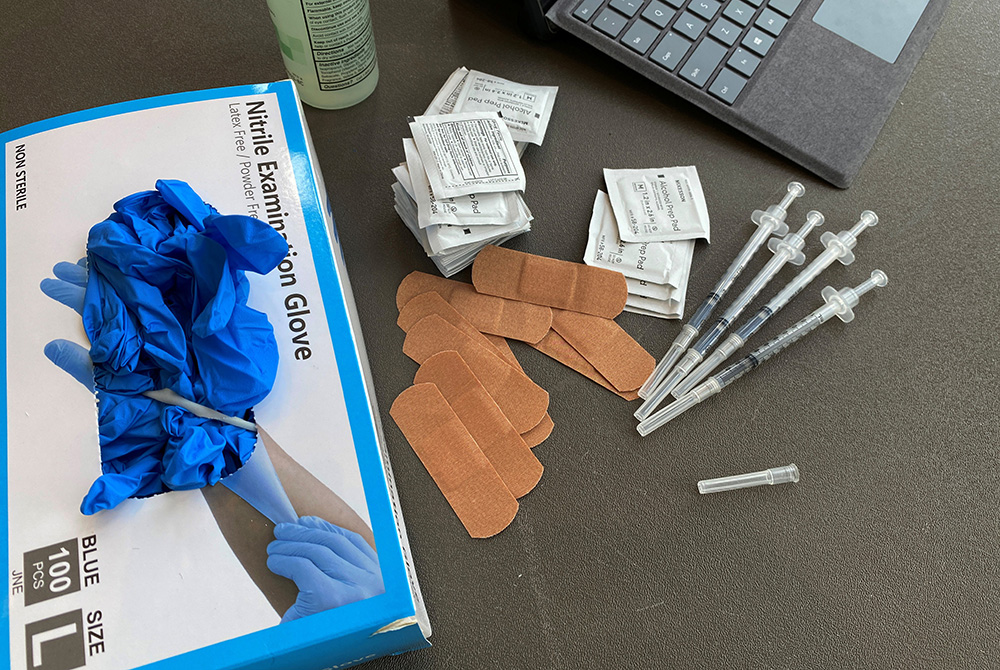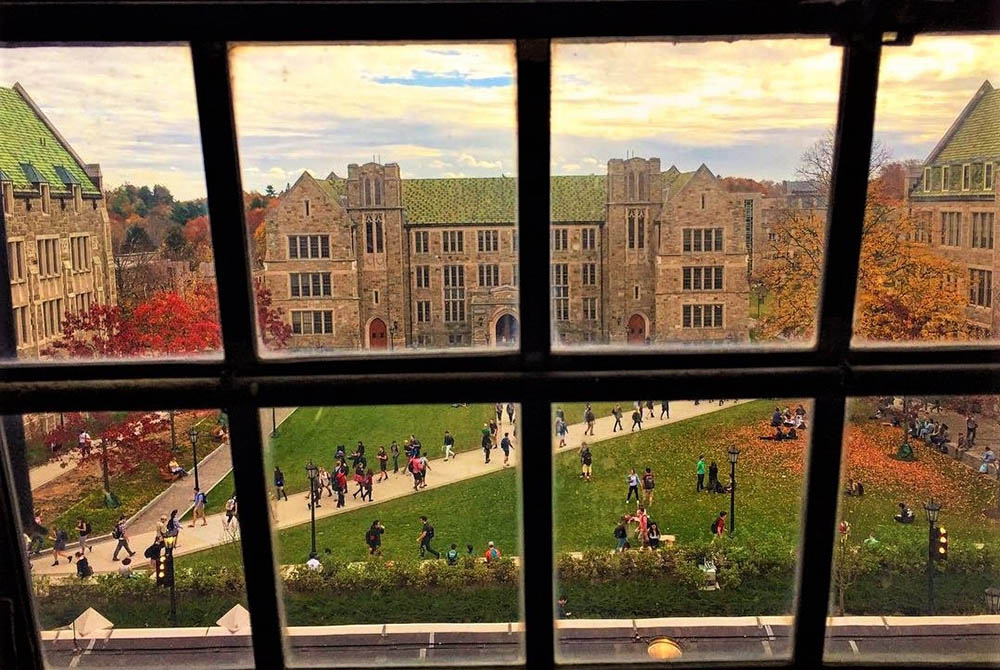
Syringes and gloves are pictured on the campus of the University of Memphis in Tennessee July 22, as students receive COVID-19 vaccines. Boston College requires that all students and faculty members be vaccinated for COVID-19 before the fall semester begins. (CNS/Reuters/Karen Pulfer Focht)
A handful of parents and students at Boston College in recent weeks have pushed back against the Jesuit institution's requirement that all students and faculty members be vaccinated for COVID-19 before the fall semester begins.
They have not only taken their complaints to school officials, but also to Catholic health care ethicists and conservative activists in Massachusetts, as well as to media outlets like The Boston Herald, which reported on July 12 that the college was facing "a wave" of parents and students "disgusted" with claims of denied religious exemptions for the vaccine.
"While we have received some push back from anti-vaxxer parents, it has been minimal," said Boston College communications director Jack Dunn, who also told NCR in an email that requiring students, faculty and staff to be vaccinated "is the correct course of action from a public health standpoint."
Said Dunn, "We are resolute in our position that vaccinations will be required for all BC community members with the exception of those whose exemption requests are approved for legitimate medical or religious reasons."
The pushback at Boston College is one example of the pressures facing Catholic university and college administrators as they try to devise plans to keep campus communities safe amid a polarized political climate and a still-active pandemic with a new transmissible variant of the novel coronavirus that is once again driving up infections.

Students walk through a quadrangle on the campus of Boston College in this 2018 photo. (Wikimedia Commons/BCLicious)
"There's definitely pressure on these [college] presidents coming from all directions," said Vincentian Fr. Dennis Holtschneider, president of the Association of Catholic Colleges and Universities.
When deciding vaccine policies for their campuses, the nation's Catholic university and college presidents are taking into account factors such as the density of the surrounding populations, local vaccination rates and their jurisdictions' public health requirements, Holtschneider told NCR.
"In the end, my experience is that they're trying to make the best decision they can using the advice of health professionals, but they are receiving a lot of pressure. There's no question about it," Holtschneider said.
As of July 22, Boston College was one of 592 colleges and universities in the United States requiring some students and faculty to be vaccinated against COVID-19 this fall, according to the Chronicle of Higher Education. That list includes several of the nation's leading Catholic universities and colleges such as the University of Notre Dame, Georgetown University, Santa Clara University, Marquette University and Loyola University Chicago, among others.
At Boston College, all students must be fully vaccinated by Aug. 23, or before moving into the campus residence halls. Students can request exemptions for "legitimate" religious and medical reasons. A physician who directs the college's Office of University Health Services reviews the requests for medical exemptions. The director of Campus Ministry reviews requests for religious exemptions.
"A religious exemption may be granted if vaccination goes against the fundamental tenets of a faith," said Dunn, who noted in an email to NCR that Pope Francis and Cardinal Sean O'Malley, the archbishop of Boston, have both spoken in support of vaccinations against COVID-19 to protect the health of individuals and the wider community.
Advertisement
However, C.J. Doyle, the executive director of the Catholic Action League of Massachusetts, a Boston-based conservative nonprofit, described BC's policy as "an appalling act of disrespect … for the consciences and convictions of faithful Catholics."
Doyle, a Boston College alumnus, told NCR that "a few people" had contacted his organization to raise concerns about the policy. He said their concerns dealt with the COVID-19 vaccines' connection to decades-old cell lines that may have been harvested from aborted fetuses.
"We understand it's not formal and it's not proximate. We understand it's a remote material cooperation, but people still have conscientious concerns," Doyle said.
Last December, the Vatican's Congregation for the Doctrine for the Faith issued a note in which the congregation said the COVID-19 vaccines could be taken in good conscience since to do so was not a formal cooperation with the evil of an abortion. The U.S. bishops' conference has also posted guidance that the reasons to accept the vaccines were "sufficiently serious to justify their use, despite their remote connection to morally compromised cell lines."
M.C. Sullivan, the chief health care ethicist for the Archdiocese of Boston, told NCR that "a handful, fewer than five" people had reached out to her to ask questions about Boston College's vaccination policy and how it squared with the Catholic Church's official teachings.
"I explained to them that the church is in favor of saving lives, and that [being vaccinated] is probably a good way to do it, but that people have their own free will, and they can decide for themselves," Sullivan said. "Some people asked about religious exemptions. We don't really have a religious exemption because there's nothing morally illicit with the medication. They heard that, and some were pleased. Some weren't."
Epidemiologists and public health experts interviewed by NCR said they supported mandatory vaccination policies like Boston College's as an effective measure to protect campus communities. They noted the rise of the virulent delta variant, which officials said is driving up infection rates all over the country.
"As an infectious disease doctor, I'm happy that a lot of the colleges and universities are requiring vaccines. The only way to stop the pandemic is to stop the virus from spreading and mutating, and the only way to do that is to get vaccinated," said Dr. Renuga Vivekanandan, an associate professor of medicine at Creighton University's School of Medicine in Nebraska.
On July 21, state and local health agencies reported more than 60,000 new coronavirus infections in the United States, an increase of almost 50% from the previous week. More than 4 million people around the world have died from COVID-19.
Dr. Kirsten Bibbins-Domingo, a professor of epidemiology and biostatistics at the University of California at San Francisco, told NCR that universities and colleges have long had vaccination requirements for students.
"And during a pandemic, when we have clear evidence of the effect of this virus, and the evidence of rising cases," Bibbins-Domingo said, "this is a time when colleges need to do what most colleges have actually done for a very long time, and that is ensure that in this environment, that we keep our students, our faculty, our staff, as well as the surrounding community, safe."
[Brian Fraga is a Catholic journalist based in Southeastern Massachusetts.]








